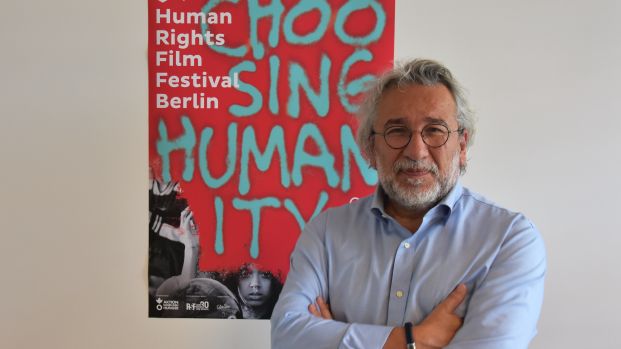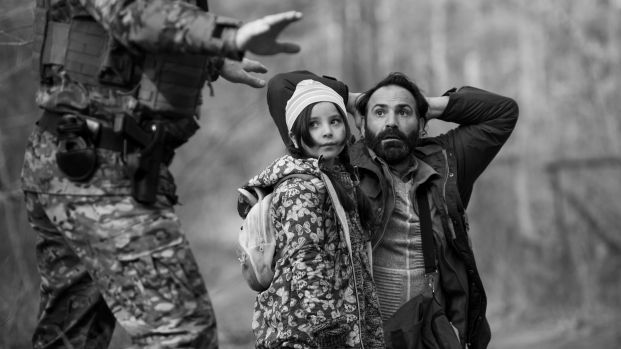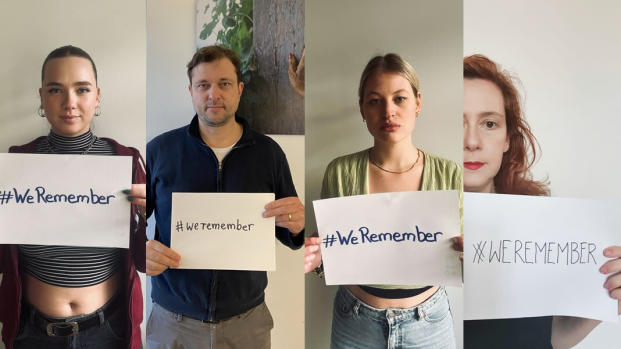
Welcome to 2023! We at the Human Rights Film Festival Berlin are looking forward to a new year full of outstanding documentaries, inspiring encounters and eye-opening conversations. We hope that 2023 will be a more just and peaceful year, and our thoughts are with those people all around the world living under repressive regimes, facing war and armed conflicts, and losing their livelihoods to climate crisis effects like droughts and floods.
In 2022, we faced discouraging moments, like when the war in Ukraine started, when girls were forced out of education in Afghanistan, and the Taliban banned female aid workers, but also when we heard from witnesses about the brutal and deadly ramifications of the ongoing conflict in Ethiopia or about the devastating situation in Yemen. And we could go on.
But despite this – or maybe because of it – we decided NOT to let ourselves be discouraged and to look to all the brave people around the world who are standing up to injustice, like the women in Iran and Afghanistan raising their voices against their oppressors, the people of Ukraine defending their country, and all the brave climate justice activists worldwide fighting for a better tomorrow. Their stories need be told, and theirs are the stories that we show at the Human Rights Film Festival Berlin.
Here is our very personal review of 2022:

At the beginning of the year, on 24 February, our world was shaken by the escalation of the war in Ukraine, which had begun in 2013. To contextualize the conflict, we hosted a special screening of ‘The Earth is Blue as an Orange’, followed by a discussion with Daniela Schwarzer (Open Society Foundations), Julian Pahlke (Bündnis 90 / Die Grünen) and Jan Sebastian Friedrich-Rust (Aktion gegen den Hunger), hosted by Kira Fischer (Aktion gegen den Hunger).

In order to highlight the important role played by women all over the world and to show how essential the fight for equality is, in March we screened four outstanding films (‘Fly so Far’, ‘Bangla Surf Girls’, ‘Finding Sally’ and ‘Writing with Fire’) at our wonderful partner cinema Sputnik am Südstern. The RBB reported on the series: Watch the report now! Watch the report now!

Over the summer, we then hosted a small screening series at the beautiful Atelier Gardens summer cinema, where we showed films that had moved us to act, such as ‘The Forest Maker’ and ‘Rebellion’. A highlight was the conversation with #RightLivelihoodAward winner Tony Rinaudo, on whose initiative the Sahara was re-greened with over 200 million trees.
In October, our year reached its zenith with the highly anticipated festival itself, which would not have been possible without the support of our colleagues from Aktion gegen den Hunger, our main partners Save the Children and Greenpeace, all our friends, supporters, partners and funders – in particular, our main funders the Medienboard Berlin Brandenburg, the Federal Foreign Ministry and the GIZ representing the Federal Development Ministry – and, of course, our amazing volunteers. We would like to say a huge thank you to all of you!

We can now look back at the festival’s brilliant opening on 12 October, where the film ‘Ithaka’, about the fight of Julian Assange’s family for his freedom, received a standing ovation. We were grateful for the attendance of Gabriel Shipton (producer and Assange’s half-brother), John Shipton (Assange’s father) and Stella Morris (lawyer and Assange’s wife).
But before the film began, Filippo Grandi – Patron of the 2022 Festival – and Luise Amtsberg – Federal Government Commissioner for Human Rights Policy and Humanitarian Assistance – reminded the audience of the many lines that are being crossed each day around the world.
Alongside a diverse film programme and wonderful, intensive discussions with our audience members following the screenings, the festival was also accompanied by a photo and VR exhibition, a reading by Kira Vinke, a live podcast and a preview of ‘The Climate Monologues’.
In addition, this year we have invited the Human Rights Tattoo Collective to focus on the Declaration of Human Rights and provide a lasting memory and talking point for those who get a letter from the Declaration tattooed at this event.
For the third year in a row, the festival also hosted the Human Rights Forum, a workshop and conference series.
We believe that stories are the key to courage. Stories have the power to inspire and arouse, to denounce grievances and injustices, and reveal solutions. They can play an essential role in peace processes and make a major contribution to rethinking society. As part of the three-day conference series, we discussed with experts what narratives could look like in the future in order to support change processes.
Here are our key takeaways from each day:
Day 1: Don’t Starve our Future

Injustice is at the heart of the #climatecrisis – those countries least responsible will be affected the most – Kira Vinke (German Council on Foreign Relations)

Movies are a great way to fight injustice – Volker Schlöndorff (director)
For the #COP in Egypt this year, we created a short conference summary that was shown at the conference’s German Pavilion in Egypt: YouTube
Day 2: New Narratives

Ecology, decolonisation and feminism are intertwined and cannot advance without one another. – Aya Chebbi (Feminist, Activist, Diplomat)

Storytelling helps us dig up the past and validate what we are feeling/facing as something rooted in what happened to us generations ago. – Emma Inamutila Theofelus (Deputy Minister of Information, Communication and Technology, Republic of Namibia)
Day 3: Open Societies

We never learned to deal with the mass of information that reaches us every day. Never learned news literacy. This is a huge threat to democracy. – Alexander Sängerlaub (Bonn Institute für Journalismus und konstruktiven Dialog)

What can we do? – Find common experiences and share sympathy and solidarity. - Volodymyr Sheiko (Ukrainian Institute)
Alongside the conference, we also hosted a new discussion series for the first time, – ‘Talking Humanity’, where we discussed a different issue every evening. In the weeks to come, we will publish the various discussions on YouTube. They were all broadcast by our partner Alex Berlin. From mid-January, the talks will also be available for viewing on our homepage.
At the award ceremony on 21 October, the festival celebrated the power of storytelling. The documentary ‘Outside’ by Ukrainian director Olha Zhurba about the turbulent youth of thirteen-year-old street kid Roma was awarded the Willy Brandt Documentary Film Award. Moreover, Iranian Nobel Peace Prize-winner Shirin Ebadi received our Honorary Award for Democracy and Freedom on behalf of the countless courageous women who are protesting against the Iranian regime. At the award ceremony, the festival team also took a stand to highlight its solidarity with Iranians protesting for their freedom.
At the end of the year, we celebrated International Human Rights Day by screening the winner of the Willy-Brand-Documentary Film Award, ‘Outside’, together with our partner the Willy Brandt Foundation. Finally, to mark the occasion of the World Football Championship, we hosted an educational screening of the film ‘The Workers Cup’ together with the 1. FC Köln Foundation for students to highlight and contextualize the human rights violations taking place in Qatar.





